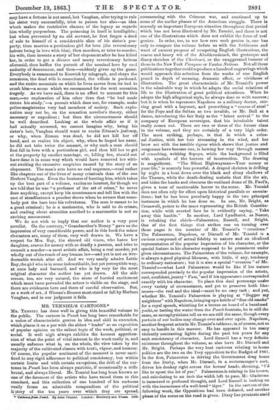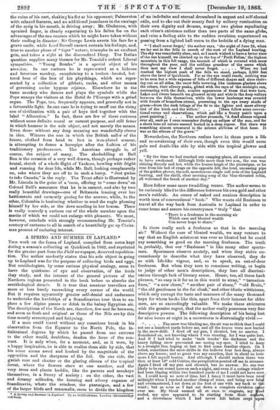MR. TENNIEL'S CARTOONS.* Mn. TENNIEL has done well in giving
this beautiful volume to the public. The cartoon in Punch has long been remarkable for a union of characteristic genius in idea and skill in execution, which places it on a par with the ablest "leader" as an exposition of popular opinion on the salient topic of the week, political, or • social. It well nigh always exhibits the keenest apprehen- sion of what the point of vital interest in the week really is, and usually enforces what is, on the whole, the view taken by the majority of the cultivated classes with truth, vigour, and humour. Of course, the popular sentiment of the moment is never sacri- ficed to any rigid adherence to political consistency, but within certain limits and with certain exceptions, the drift of the car- toons in Punch has been always patriotic, if occasionally a trifle brutal, and always liberal. Mr. Tenniel has long been known as one of the foremost of the artists who have raised them to this standard, and this collection of one hundred of his cartoons veally forms an admirable compendium of the political listory of the ten years over which they are spread,
saleveges free Peach. By John Tenniel. London: Drafter:and Enna 1863. commencing with the Crimean war, and continued up to some of the earlier phases of the American struggle. There is scarcely an important European situation throughout that period which has not been illustrated by Mr. Tenniel, and there is Rd one of the illustrations which does not exhibit the force of real genius. In order, too, to see how rare such genius is, one has only to compare the volume before us with the feebleness and want of earnest purpose of competing English illustrations, the coarse and heavy wit of the Kladderadatsch, the grotesque and flimsy sketches of the Charivari, or the exaggerated humour of those in the New York Picayune or Yankee Notions. Not all those publications together could reproduce a hundred engravings which would approach this selection from the works of one English pencil in depth of meaning, dramatic effect, or vividness of illustration. The great characteristic of Mr. Tenniel's power is the admirable way in which he adapts the social relations of life to the illustration of great political situations. When he adopts the high allegorical style, he always does so with success ; but it is when he represents Napoleon as a military doctor, stir- ring gruel with a bayonet, and prescribing a "course of steel" for the Pope and the Sultan as two invalids, or Mr. Bull at a dance, introducing the fair Italy as the "latest arrival" to the company of European sovereigns, that his inimitable talent really comes out. There are two or three of the former class in the volume, and they are certainly of a very high order. The most striking, perhaps, is that in which a colos- sal Justice, with her hair streaming in the wind, and her brow set with the terrible rigour which shows that justice and vengeance have become one, is hewing her way through masses of crouching, writhing Sepoys, while the background is filled with symbols of the horrors of insurrection. The drawing is magnificent. "The Silent Highwayman—Your money or your life," is scarcely less powerful. A draped skeleton is drifting by night in a boat down over the black and slimy shallows of the Thames, while the death-dealing malaria that fills the air, and hides the banks and obscures the outlined dome of St. Paul's, gives a tone of unutterable horror to the scene. Mr. Tenniel does not often rely for effect upon historical parallels or associa- tions; but he has been peculiarly happy in the two principal instances in which he has done so. In one, Mr. Bright, as Cromwell, points to the mace representing the British Constitu- tion, while with averted face he is evidently saying, "Take away this bauble." In another, Lord Lyndhurst, as Nestor, is rebuking the chiefs—Palmerston, Russell, and Bright. One of the first things that strikes one on turning over these pages is the number of Mr. Tenniers "creations." The Palmerston, Napoleon, or Disraeli of Mr. Tenniel is a curious compound of actual fidelity to nature and an idealized representation of the popular impression of his character, or the special feature in his character supposed to be prominent under given circumstances. The Palmerston of the volume, for example, is always a good physical likeness, with little, if any, tendency to ordinary caricature ; but it is also a special " creation " of Mr. Tenniers—what Lord Palmerston would be like if his nature corresponded precisely to the popular impression of the astute, cool, confident, jaunty" Pam," and if his appearance corresponded exactly with his character. To place this dual personage tinier every variety of circumstance, and yet to preserve both like- nesses—the real and the ideal—must be no easy task ; and yet, whether Mr. Tenniers Palmerston is playing at "Beggar my neighbour" with Napoleon, bringing up a bottle of "fine old smoke" for a royal speech, whistling for a breeze on board of a becalmed yacht, or tasting the water from the Punch fountain, he is still the same, as metaphysicians tell us we are still the same, though every particle of our bodies may change over and over again. Napoleon, another frequent actorin Mr. Tenniers tableaux, is, of course, not so easy to handle in this manner. He has appeared in too many violently contrasting lights during the past ten years for any such consistency of character. Lord Russell has a very definite existence throughout the volume, as also have Mr. Disraeli and Mr. Bright. Perhaps the very best cartoons relating to home politics are the two on the Tory opposition to the Budget of 1861. In the first, Palmerston is driving the Government drag home from the Derby, when Mr. Disraeli, in a costermonger's cart, drives his donkey right across the horses' heads, shouting, "I'd like to upset the lot of yer." Palmerston is reining in his horses, and calculating to an inch the width left to pass, Mr. Gladstone is immersed in profound thought, and Lord Russell is looking on with the insouciance of a well-bred" tiger." In the cartoon of the following week, the Opposition had been defeated, and another phase of the scene on the road is given. Dizzy lies prostrate amid the ruins of his cart, shaking his fist at his opponent; Palmerston with relaxed features, and an additional jauntiness in the carriage of the sprig in his mouth, is driving away; Mr. Gladstone, with upraised finger, is clearly expatiating to his fallen foe on the advantages of the two courses which he might have taken without their ending in disaster ; Sir George Lewis averts his face for a grave smile, while Lord Russell cannot restrain his feelings, and, true to another phase of " tiger " nature, triumphs in an exultant grin, and takes a sight at the discomfited Dizzy. The Italian question supplies many themes for Mr. Tenniel's ardent Liberal sympathies. "Young Bombe." is a special object of his aversion. In one cartoon he is represented as a hideous and ferocious monkey, complaining to a broken - heided, bat- tered bear of the loss of his playthings, which are repre- sented by a collection of gibbets, racks, and other means of governing under bygone regimes. Elsewhere he is the tame monkey who dances and plays the cymbals while the Pope annoys the visitors at the Hotel de l'Europe with a grind organ. The Pope, too, frequently appears, and generally not in a favourable light. In one case he is trying to snuff out the rising sun of civilization with a pair of keys tied together with the label "Allocution." In fact, there are few of these cartoons without some definite moral or earnest purpose, and still fewer in which humour is the sole object, and not merely the means. Even those without any deep meaning are wonderfully clever in idea. Witness the one in which the British sailor of the future, clothed from head to foot in iron-plated armour, is attempting to dance a hornpipe after the fashion of his traditionary predecessors. The American struggle is, of course, the subject of many. The skedaddling at Bull Run is the occasion of a very well drawn, though perhaps rather brutal, sketch of a whole flight of Yankees, bowling with fright and running for dear life, while Mr. Bull, looking complacently on, asks where they are off to in such a hurry. "Jest gwine to take Canada," is the reply. The Trent affair is illustrated by Mr. Lincoln in the guise of a 'coon, offering to "come down" on Colonel Bull's assurance that he is in earnest, and also by two really .beautiful drawings—one of Britannia leaning, over her battlements and earnestly gazing for the answer, while, in the other, Columbia is hesitating whether to send the eagle pluming himself by her side, or the dove nestling in her bosom. There
is really scarcely a cartoon out of the whole number upon the merits of which we could not enlarge with pleasure. We must, however, conclude with strongly recommending Mr. Tenniel's century of cartoons to all in search of a beautifully go: up Christ- mas present of enduring interest.



































 Previous page
Previous page